It’s Friday, late afternoon, 23 days since my last in-person social interaction. Unless we’re counting the “thank you” I muttered to the barista’s apron a few minutes ago, my happening social life has whittled down to the size of my phone screen, through which my mother pesters me from two continents away. In the evening, I’ll walk the bustling streets of Montreal, because the only socializing I can manage is to morosely observe people enjoying the company of others.
The buzz of my iced Americano has replaced the deafening white noise that has plagued me for years. I was supposed to write this morning and apply for jobs at noon, but I was up late bingeing the sitcom New Girl. Since I missed both time blocks and ruined my day, I mitigated this by wasting the next few hours drowning the white noise of my self-loathing with more New Girl.
Several weeks ago, I was embracing solitude: I was waking up at 9 AM, working part-time, applying for jobs, writing my essays, basking in the spring sunlight, gazing at trees while listening to music, and observing strangers with fascination. It was the impact of watching Wim Wenders’ 2023 film Perfect Days and its quiet, monk-like protagonist Hirayama. However, I couldn’t sustain my idyllic aloneness for more than a month. The rustle of the trees couldn’t curb the gnawing loneliness.
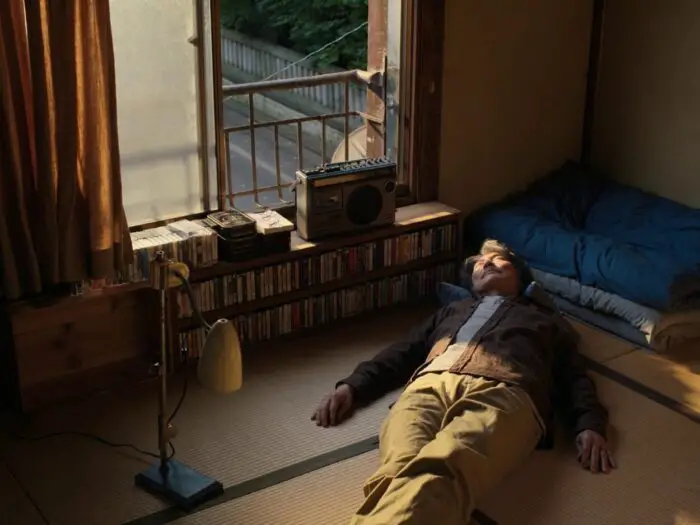
After floundering for several weeks, I watched Perfect Days again, hoping that Hirayama’s routine of simplicity would soothe me as it did on my first watch. However, approaching art with a utilitarian purpose like a decided-upon response never works. Instead of allaying the white noise, Perfect Days sent me spiraling into a reevaluation of myself.
Perfect Days was co-written by Wenders and Takuma Takasaki. The film stars Kōji Yakusho as Hirayama, a janitor for the Tokyo Toilet Project. Hirayama leads a structured and monastic lifestyle, and his days include a concerted effort to enjoying the sublime in the mundane, which includes reveling in the beauty of nature, enjoying ’70s music, and reading literature. The film follows Hirayama for two weeks, during which his co-worker, niece, and other circumstances disturb this routine. But he always returns to it. His co-worker, Takashi, asks Hirayama to lend him his van; his niece Niko runs from his sister’s home to live with him; he is forced to work for the entire day when Takashi quits; and he encounters a dying man with whom he shares a poignant moment. Over the film’s runtime, we learn about Hirayama’s simple approach to life, his weekly routine, and how he responds to the needs of others.
Perfect Days opens with a regular working day in Hirayama’s life: he wakes up, folds his futon, waters his plants, brushes his teeth, grooms his facial hair, wears his overalls, takes his things, opens his door, and starts the day with a brief and blissful moment to gaze at the morning sky. He drives to work listening to 70’s music on cassette tapes. He cleans the public toilets conscientiously; he admires the shadows the swaying branches make; he captures the canopy of trees with his film camera during lunch. He returns home and takes a shower in the public bathhouse, goes for dinner at a local restaurant, and then reads before drifting off to sleep.
On first watch, this sequence was a disarming, gentle caress, silencing the white noise with a display of life so aspiringly antithetical to mine. As a somewhat self-aware, over-ambitious, resentful slacker who’s stumbled my way to every milestone, I felt I needed to analyze and learn from Hirayama’s routine, contentment, and grace.
Hirayama enriches every moment with intrinsic satisfaction in his work, aesthetic enjoyment of beautiful things, and intellectual fulfillment through literature. Even though janitorial work is thankless, Hirayama does his work meticulously. Hirayama’s work ethic starkly contrasts with his whiny colleague Takashi, who questions the point of cleaning a public toilet so thoroughly. While Takashi arrives late riding a scooter, Hirayama comes with a van full of dedicated tools to reduce tedium and increase precision. Hirayama takes pride in doing his job well, which allows him to work without that ubiquitous cynicism.
Hirayama instills this fulfillment-based consistency into other aspects of his life. Plants, music, photography, sky, leaves, and trees—Hirayama designates time to indulge in simple, aesthetic pleasures that enrich his structured days. Similarly, Hirayama reads one book a week. During the weekend, he finishes his errands, among which he develops the roll of film he captured and buys a new book to replace the one he finished over the week. Having stripped off the desire for capital, sex, attention, or power, Hirayama focuses on finding satisfaction in what he does rather than seeking gratification from what he may achieve. This ethos is illustrated by his game of X and O with a stranger he never meets. They exchange moves by leaving the paper in a crook of a bathroom. Hirayama is neither curious about his opponent’s identity nor the result. He just enjoys playing the game.
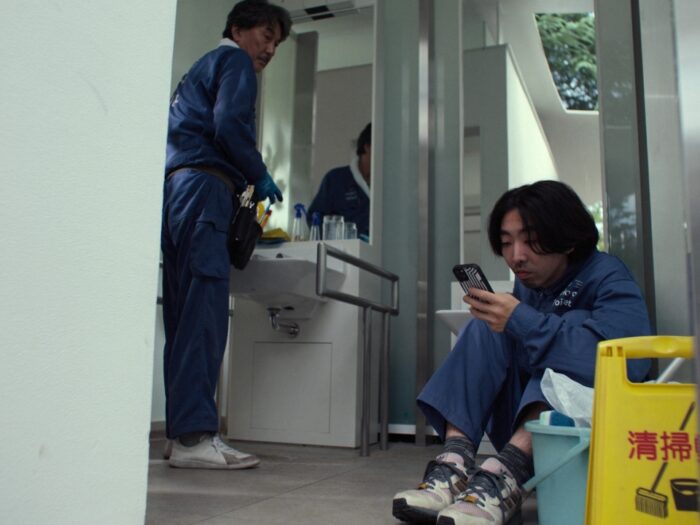
Hirayama’s ethos affords him an intentionally blinkered perspective that powers him to overcome the indifference, contempt, and concern that he receives as a janitor. When he discovers a lost boy in a toilet, he comforts and leads the boy outside to find his mother. When she finds them, she snatches him from Hirayama, wipes the boy’s hands, and walks away without even acknowledging Hirayama. Yet, all he takes from the moment is the boy slightly turning back to wave at him. It’s this selective lens that impacts Niko, his niece who stays with him briefly. She watches with trepidation as a schoolgirl sneers at him while he vacates a toilet for her use. But when Hirayama finds Niko’s eyes, he smiles at her, completely unfazed, thus disarming Niko’s concern, who goes on to show deep interest in his work and his tranquil lifestyle.
Hirayama’s perspective and practice engender a contentment that permits him to stay in the present. He teaches an absorptive Niko: “Next time is next time. Now is now.”
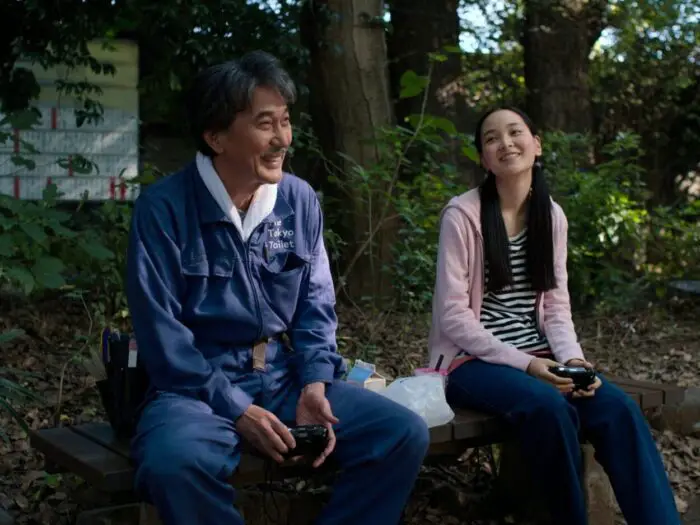
For months, I’ve languished in a transitory period that simultaneously calls for the past and future. I recently got a master’s degree half an year after all my friends finished and left Montreal. While pursuing the degree that twenty-one-year-old me dreamed of, I was struggling, resenting my cohort’s ease with executive function. How were they finishing their readings, working part-time, and going out weekly? I was barely finishing half my readings and failing at my part-time job. On most weekends, I stayed home to catch up, simmering in my failure to keep up. When I did meet my friends, I couldn’t shake my pangs of confusion. When my mother asked why I couldn’t just “do it on time,” I had no answer. When I tried following my friends’ routines, I’d fail miserably.
Consistency is my bane; inspiration and distraction are my specialty. During that time I was trying to publish my work because I desperately needed my distractions to mean something. But rejected pitches became part of my slacking routine.
When everyone left Montreal, I felt relief. Now I’ll write. No comparisons. No distractions. But now I’ve been alone for months, and I’m still playing catchup to my ambitions. My active resentment was replaced with an unabating longing for my squandered joy of being among friends. I not only missed the friends I made in Montreal, but also those back home. I’m reminded of the Aymara people’s conception of time as passing through us rather than us through it. My present has ALWAYS been the worst time because I’m either longing for the past or anticipating a future. If time were indeed passing through me, I taint time when it touches me.
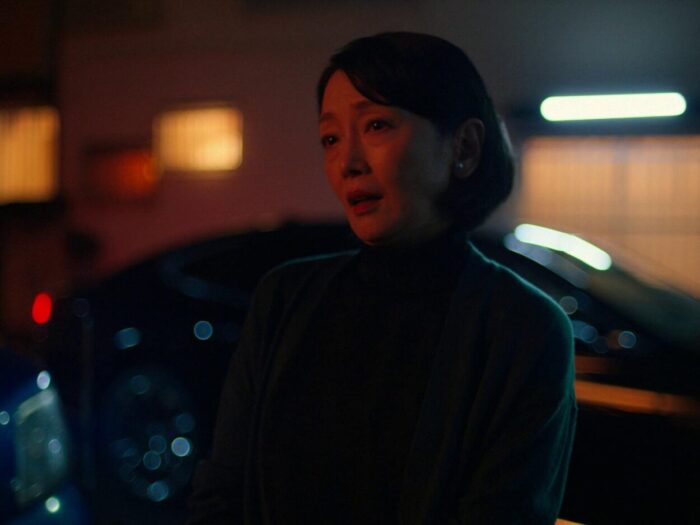
Hirayama may be the model of contentment in comparison with myself or the constantly bemoaning Takashi, but his refined taste and monk-like mentality belie a past of privilege. Wenders has mentioned that Hirayama “definitely came from a privileged life before.” This is indicated when his rich sister arrives with a butler to take Niko back. She asks if he would visit their ailing father—which he rejects—and if he really clean toilets. Hirayama straightens himself, looks her in the eye, and says “Yes.” Hirayama possesses greater agency than others in his socio-economic bracket because he has no dependents. He also chose to forgo economic advantages in favor of this simple life.
Yes, yes, boo-freaking-hoo, I know I have champagne “problems.” I have a roof over my head, plenty of food, education of choice, no dependents, and, like Hirayama, taste to enrich my life with art and literature and even the translucent shimmer of the leaves visible outside this café. How will I ever survive? I even have the privilege of a loving mother calling to check-in daily. Today, before I left for the cafe, she asked me how the writing was going, what my piece was about, had I done the admin stuff my father asked me to complete, what about the job applications, did I get any responses, why not, and what about the—
AAH! I snapped at her, because I can’t silence the incessant white noise that screams how I’m not scoring through these arbitrary goalposts that I keep shifting. You got your bachelor’s degree? Well, you should be working towards your master’s. Got your masters? You should’ve been a published writer years ago. Wim Wenders made his first film at 25! What are you even doing with your life? And on and on and on and ON!
It’s just easier to silence the inner dialogue by making life a putrid lazy river sustained by New Girl reruns.
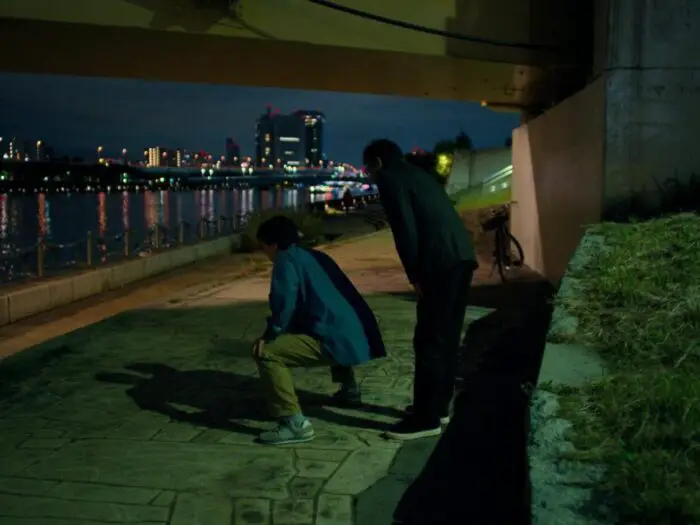
In light of the complicated familial encounter, Hirayama meets a man dying of cancer. He explains his situation, wondering about his latent curiosity that will die with him, like whether shadows darken when they overlap. Instead of stewing in his own problems, Hirayama truly sees the man and shares the drink and smoke he intended to use for himself. He then indulges the dying man’s curiosity by trying to overlap their shadows under a lamppost. Hirayama then suggests a game of shadow tag, giving the dying man a fleeting but noteworthy reprieve. Hirayama’s “now is now” ethos grants him the capacity to respond to someone else instead of languishing inside his head. Because Hirayama lives in the present, he can be of service to others. That’s the quality I’d like to work towards.
Usually, I’m too caught up in my self-pity to acknowledge my mother’s relief during the few minutes she sees my face, empathize with her anticipation as she’s ringing me, or consider what the specifics of her prayers must be because she cannot intervene in her son’s well-being. To change that, to be considerate of my mother, of others, would require that I try living in the present.
Asymptotic as Hirayama’s discipline might be, the crux of his lifestyle is that doing is the best part. My focus should be on what I’m doing rather than how little I’ve done, because everything I’ve done since the white noise started has been what I wished for before. Everything I will do in the future is what I beat myself up for not doing today.
When I leave this café, I’ll not avert the eyes of the Montreal crowd and look at its cracked sidewalks. Instead, I’ll look up towards an interesting street sign, a tree, or a mural. If I meet someone’s eyes, I’ll try to nod and smile, even if it’s scary. I’ll try giving what I wish someone in this city gave to me. My brief fixation with Perfect Days will not solve my flaws permanently. But I’ll try to be consistent, attentive, and grateful. Eventually, I’ll slack off, and then I’ll try at it again. Tomorrow, I’ll wake up, make my bed, freshen up, and actually talk to my mother. Later, when I step out of my apartment complex, I’ll take a brief but blissful moment to look up and acknowledge that the sky is still up there, going nowhere, just like my arbitrary shifting goalposts.



